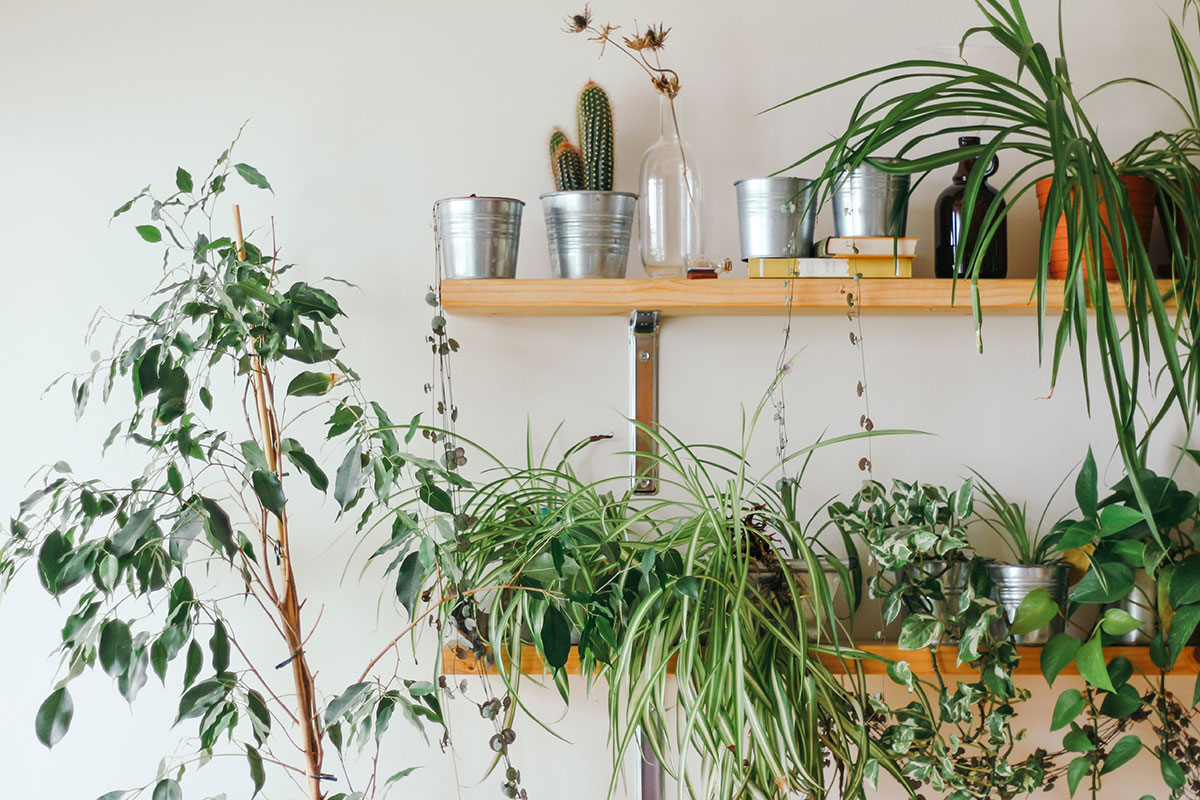In this current climate it is normal to feel anxious and overwhelmed, creating a plant space or filling each room with plants will subtly ease you into meditation. An environmentally rich addition to you house will ease stress levels and relax your mind. Active plant care is a small but effective way to look after your mental wellbeing.
By bringing your attention to caring for your plants, you can focus solely on the present moment and distract your brain from anxious thoughts. Plants are also a great way to take a much-needed technology break, focusing on your plants even if it is a few minutes a day, forces you to stop and appreciate what is around you.
To further explore plants and mental health, their psychological effects, and whether they’re good for you we’ve enlisted the help of mental health experts at Support Room.
Psychological Effects of Indoor Plants
Plants are more than decorative objects. Studies have found that plants can help to improve your mood and have been linked with certain psychological and physical benefits. For example, cleaner air or lower stress levels.
Improves air quality – Plants are natural air purifiers and help to remove toxins from the atmosphere. Depending on your exposure, chemicals in the air could lead to negative health effects depending on your exposure. Plants can take carbon dioxide from the atmosphere and produce oxygen which improves the air quality. They also have properties which help to reduce airborne dust levels and increase air humidity so you can eliminate coughing, fatigue and itchy eyes.
Anxiety – Indoor plants can lower levels of anxiety. You may find that being surrounded by plants can reduce symptoms building up and restore calm. Taking care of them can also be therapeutic. In Manchester, certain medical clinics have even “prescribed” potted plants to those suffering with mental health issues.
Productivity – Plants can help with productivity; research has proven that people perform better at attention-based tasks when surrounded by plants. Everyone has certain days in which they spend a lot of time staring at a screen, unable to be productive, all you need to solve that is plant therapy. A research study conducted at Exeter University found out that indoor plants can improve concentration, productivity and staff well-being by 47%. These effects come from stimulating plant colours, calming aromas and oxygenating abilities. Since many of us are working from home, we spend several hours indoors and are being exposed to high amounts of CO2. This makes it harder to concentrate and think clearly. The oxygen that is created by indoor plants helps to balance the level of CO2 in our bodies.
Which plants are good for mental health?
Aloe verais one of the easiest plants to take care of and helps purify the air. Usually, you can cut off the leaves to treat a wound or to repot it. So, you might find that cutting off the leaves to repot it can symbolise getting rid of things no longer necessary for its growth.
Lavenderis an extremely popular plant, for good reason. Many people use the scent to help them calm down, which is why it’s effective for anxiety or sleep. Lavender is also a beautiful plant to have indoors.
You can also consider eucalyptus, due to its clean aroma. Eucalyptus can help clear your mind and is useful for colds or asthma.
Peace liliesare also worth investing in, as they can neutralise harmful indoor chemicals. More than that, people have found that their mental, physical, and spiritual wellbeing thrive because of it.
Lastly, snake plantsare incredibly durable and so don’t require a lot of attention. Since they convert carbon dioxide into oxygen, they can also purify the oxygen wherever they are. Plants can provide the perfect opportunity for this lockdown to lift your spirits up. They’re not only beneficial when it comes to decoration, but they can improve your physical and mental wellbeing.
For more help and support visit the experts at www.supportroom.com




